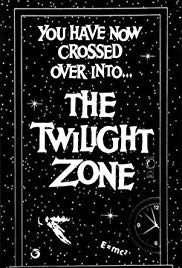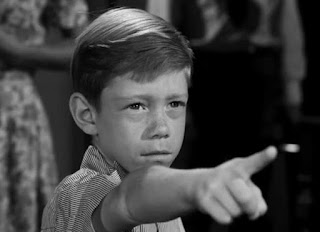Tom Elliot is the producer and host of The Twilight Zone Podcast. In the nine years since it's debut, Tom has produced nearly two hundred episodes of reviews, readings and interviews and last year won a Rondo award for 'Best Multi-Media Site'. The podcast is available for streaming on Apple, Stitcher, Podbean and many other sites and you can check out the show’s website at,
thetwilightzonepodcast.com
Here is an interview I recently did with Tom where he waxes on all things Twilight Zone and gives us his top five episodes.
CASEY: Tell me about your early days.
TOM: I was born and bred in Liverpool in the U.K. Depending on what you are into, it's probably best known for either The Beatles or Liverpool Football Club. I've lived all over though, including the U.S. Watching shows like The Twilight Zone from a young age in a working class city like Liverpool contributed to my romanticized view of the U.S as the place where all the "big things" happen. My love affair with the United States started early and continues to this day.
CASEY: When did you start watching The Twilight Zone?
TOM: It was either back in the late eighties or early nineties when I was still a child. They used to put The Twilight Zone on at about two o'clock in the morning on one of the U.K channels. I used to stay up in those days because some of the best cult television was on at that time of the morning. It could be British shows like The Prisoner or classic Godzilla movies --all manner of good stuff was played in the small hours including The Twilight Zone.
I liked it because I'd never seen anything like it. It was such a mind expanding show. As a child who was used to stories going from A to B to C, it was such an eye opener to watch stories that went from A to B to X! And then when you grow up and watch the episodes again, you realize that there's a whole other level to them that you may have missed as a child.
CASEY: When did you start The Twilight Zone Podcast?
TOM: I started the Twilight Zone Podcast in late 2010. I had purchased all of the DVD sets but they sat on my shelf un-watched. At that point, I was doing a horror movie podcast (The Strange And Deadly Show) and reviewing DVDs for a website, so it was a case of me only watching what I was reviewing, so I decided to watch The Twilight Zone.
Initially, it was just going to be really short basic reviews lasting about fifteen minutes but, as time went on, I just fell in love with the show and the philosophy of Rod Serling. I couldn't discuss it on that basic level anymore. I had to dive in as deep as I could.
This obviously meant it was more work as I started to put more and more into the show but that is part of the enjoyment for me. Sometimes you begin to look at an episode which seems like any other run of the mill episode at the time but you discover that, actually, once you start digging you end up going down the rabbit hole. An episode like Dust would never be on anyone's top ten list but it has a story behind it like nothing else. I ended up doing a feature length episode on that one.
CASEY: You recently attended Serling Fest in New York, what was that like?
TOM: Serling Fest is a festival in Binghamton, New York, Rod Serling's hometown that's been held
 |
| Rod Serling |
I was lucky enough to take part in one of the panels at the event and was able to interview most of the guests for the podcast. I was also able to go and pay my respects to Rod Serling at his grave and I also met his daughter, Anne Serling, who I have been in touch with for several years. It was a great honor to do both things and it's only through doing the podcast that I've been able to have that opportunity.
CASEY: What do you think of the new Twilight Zone series?
TOM: It's been such a divisive thing but I understand it's actually been a hit for CBS All Access. I think often the hardcore fans in any fandom seem to be the ones who have the hardest time coming to terms with change, whereas, the more casual fans take just what they enjoy from things and get on with it. Strange as it may seem, considering I've spent the last ten years digging deep into The Twilight Zone, I'm more with the casual fans on this one. The thing is, nothing will ever match up to the original and, some will say they shouldn't even try bringing it back. I respect that view, even though I don't agree with it.
There's a lot of debate about the changes that have been made like episode length and broadcasting in color, but honestly, I don't really care about any of those things. My way of thinking is this; had The Twilight Zone not gone off the air in the sixties and carried on for decades, similar to Doctor Who, then the show would have naturally evolved. Serling may have stepped away from being so hands on and became producer and the executive producer and then walked away entirely. We would have eras of The Twilight Zone defined by show runners and creative teams the same way we have eras of Doctor Who and Star Trek. Quite rightly, fans would have their preferred eras or maybe they would still be of the mind that the first five seasons are the ones that count and that's absolutely fine.
So for me, what it does that's the same as the original Twilight Zone is the same enough. What it does differently is not so different that it's a deal breaker. I like the new show and I'm happy for it to exist as a companion to the original. It doesn't replace it nor is it intended to. I'm looking forward to what they do next.
CASEY: What are your top five episodes?
TOM: Top fives are always tough because they can change from day to day. I also must stress that I don't watch ahead in The Twilight Zone from where I go up to in the podcast. I'm currently near the end of season three, so there may be episodes in seasons four and five that would make the list.
5. The Monsters Are Due On Maple Street
Maple Street is the story of a group of neighbors who gradually start to turn on each other when strange things start to happen in their neighborhood. It's a classic take of humankind's propensity for turning on each other. There are themes of racism, scape-goating and it's as relevant now as when it was made. Required watching for not just Twilight Zone fans but human beings in general.
4. It's A Good Life
Serling was a very prolific writer of his own stories but some of his best work was actually adapting other people's stories. There are several instances of Rod Serling adapting a short story and improving it immensely. It's A Good Life is the story of Anthony Fremont, a boy with god-like powers and how the local community has to deal with that. The short story is very good in its own right but Serling distills its essence into one of the best Twilight Zones ever made.
3. Mirror Image
2. Shadow Play
While Rod Serling often wrote cautionary tales, or tales with a strong moral core, Charles Beaumont was the master of writing stories that were just there to fracture your mind and Shadow Play is one of the best.
1. A Stop At Willoughby
One of Rod Serling's recurring themes was getting to a point in life where you start to look at where you are, what you are doing with your life and, perhaps, wondering what the point of it all is. In Willoughby, the main character is very much experiencing this to the point where whenever he falls asleep on the train on the way home from work, he wakes up in an idealized and idyllic American town called Willoughby. The ending is pretty dark and ahead of its time in terms of themes it is looking at but ultimately, it's one of those themes you grow into as an adult when you start to question these things yourself.
— Casey Redmond
November, 2019
The Twilight Zone Podcast
Serling Fest
Casey’s Website







No comments:
Post a Comment